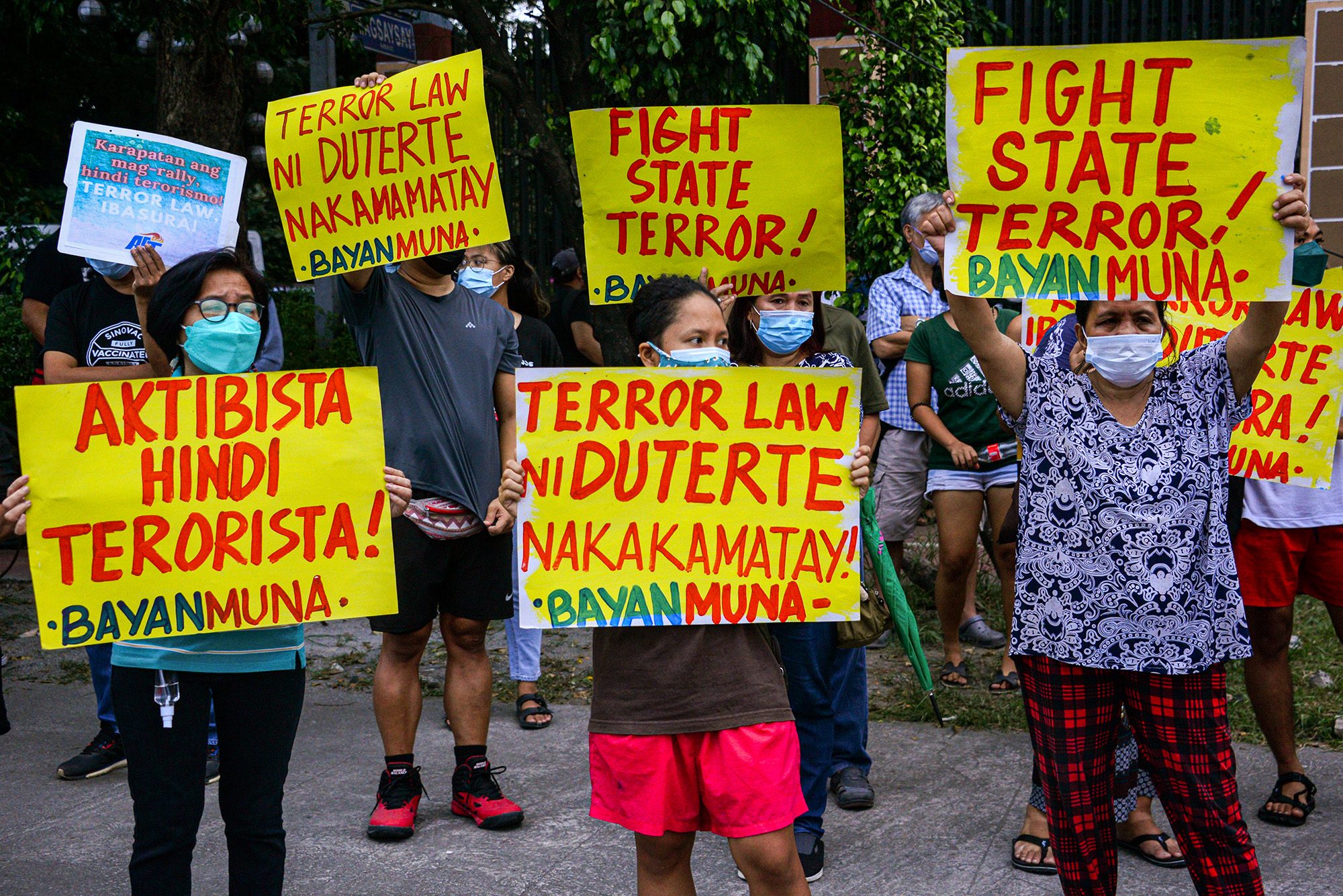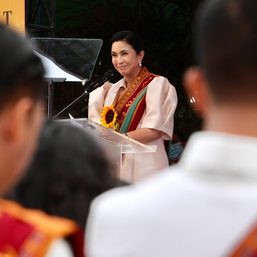SUMMARY
This is AI generated summarization, which may have errors. For context, always refer to the full article.

MANILA, Philippines – Personalities from the Philippine opposition on Thursday, December 9, hailed the “partial” win in the Supreme Court’s decision to uphold most of the controversial anti-terror law. At the same time, members of the opposition – a handful of them petitioners in the challenge against the law – said they plan on challenging the High Court’s ruling on the laws remaining “problematic provisions.”
Vice President Leni Robredo, the de facto head of the Philippine opposition, said she “hoped” the full decision would “substantially resolve” other concerns raised by petitioners against the controversial law.
“We remain steadfast in our position: Any Anti-Terrorism legislation must truly address the root causes of terrorism, and should not be used as a pretext to stifle freedom of expression or legitimate dissent,” said Robredo, who is also seeking the presidency in 2022.
“We will continue to make our case in our motion for reconsideration. Hopefully the Supreme Court will reconsider. But for now, we take our victories and use them as inspiration moving forward,” said opposition coalition 1Sambayan convenor and anti-terror law petitioner Howard Calleja, in a statement released after the High Court, through its public information office, released a short advisory on December 9.
The Supreme Court had voted on the petitions against the law on December 7. A full copy of the decision has yet to be released.
ACT Teachers Representative France Castro, in a separate statement, welcomed the strike down of portions that “equates activism and standing up for one’s rights with terrorism” but said the provisions that the Court upheld were “still abhorent to the Constitution and dangerous to the rights of the people.”
The Supreme Court upheld most of the law, including the 24-day detention power. Only two parts of the law – a phrase under Section 4 that would have made dissent or protest a crime if it had intent to cause harm and a provision that allowed the anti-terror council to designate a person or group as terrorists based on another country’s request.
In a statement, senatorial candidate Bayan Muna Chairperson Neri Colmenares, who is also counsel-petitioner in the case, said provisions allowing authorities to detain people for up to 24 days without charges, the anti-terror council to designate people as terrorists at will and freeze their assets, among other things, must still be striked down.
“We plan to challenge the Supreme Court’s declaration that almost all the other provisions of the law are not unconstitutional,” he said.
Labor leader and lawyer Sonny Matula, another senatorial aspirant, echoed Colmenares’ sentiments, pointing out that the law’s provisions, particular the one on the freezing of assets, could restrict the freedom of a trade union.
“These problematic provisions are contrary to due process, right to be secure in persons, houses, papers and effects, rights to freedom of association, among others, which are protected by the fundamental law and internatiomal treaties and conventions that our country signed,” said Matula, who is also a petitioner.
Two opposition legislators who voted against the law before the Senate also sounded alarm over the “dangerous provisions” that remain in the law.
“For instance, the provisions on prolonged detention and warrantless arrests we believe run contrary to the Bill of Rights and can be abused by law enforcers.
“It would have been a meaningful gift in celebration of International Human Rights Day to have the dangerous provisions stricken out,” said vice presidential candidate Senator Kiko Pangilinan, who is also a petitioner in the challenge against the law.
Reelectionist Risa Hontiveros also raised alarm over provisions that allow prolonged detention and the “dubious definition of terrorism” as ones that “can be used to punish acts of legitimate dissent.”
“I have yet to read the full decision of the Court, but let me remind those who will implement this law: The Anti-Terror Law does not give you the license to suppress dissent and trample on fundamental rights. It is not an excuse to oppress and kill ordinary Filipinos. The Senate can and will use its oversight functions to protect Filipinos from state-sanctioned abuses and misdeeds,” she said.
Albay Representative Edcel Lagman, who is also a petitioner, said the Supreme Court’s decision “fails to fully uphold and protect due process, human rights, and fundamental freedoms which are derogated by the controversial statute.”
President Rodrigo Duterte signed the measure into law in 2020, in the middle of the coronavirus pandemic, shortly after it was passed by both houses of Congress – which are dominated by Duterte allies. The law is widely seen as a crackdown on dissent and a threat to democracy in the country. – Rappler.com
Add a comment
How does this make you feel?
![[Closer Look] ‘Join Marcos, avert Duterte’ and the danger of expediency](https://www.rappler.com/tachyon/2024/06/TL-trillanes-duterte-expediency-june-29-2024.jpg?resize=257%2C257&crop_strategy=attention)














There are no comments yet. Add your comment to start the conversation.